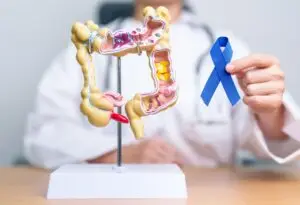Reviewed by Kimberly Cabe, FNP-BC of Forum Health Rochester Hills
Almost everyone with significant fatigue or extra weight around their middle has thought at one time or another, “I wonder if I have an “underactive thyroid?” We all know that the thyroid is important for metabolism, but few people realize that thyroid hormone is vital for our survival and required for ALL the major functions of our body. Every cell in the body has thyroid hormone receptors on it!
In the brain, the thyroid affects our ability to think and remember (cognition and memory), as well as our mood. Lack of adequate thyroid hormones can cause anxiety or depression, through the effect on our neurotransmitters, which are the brain’s chemical messengers.
In the heart, thyroid hormone can affect electrical activity (heart rate), blood pressure, and the strength of each heartbeat (contractions). Thyroid hormone is also important for cholesterol metabolism, nerve health, hair growth, intestinal function, and reproductive health (menstrual cycles & fertility).
As you might imagine, the symptoms of low thyroid are numerous (and to be fair, other disorders can also cause these symptoms). Below is a list of the most common:
- Fatigue
- Weight gain
- Constipation
- Dry skin
- Hair loss
- Cold hands and feet
- Brain fog
- Memory problems
- Depression, hair loss
- Elevated cholesterol
- Palpitations
- Menstrual irregularity
- Infertility
- Low blood pressure
- Low body temperature
- Low heart rate
The diagnosis and management of thyroid disorders are perhaps one of the most contentious areas in medicine today. There are major differences between the approaches of traditional and integrative medicine practitioners. The origins of the controversy go back decades and are both philosophical and political, but the crux of it is this.
Traditional practitioners believe:
- You only need two lab tests to diagnose thyroid disorders (TSH and free T4)
- “One size fits all”: If your labs are “Normal” (i.e. in the standard reference range), you are fine. (NOTE: This might also be called the “congratulations, you’re like everybody else” range — which is NOT ideal if we look around us!)
- Labs are more important than your symptoms. (i.e. Ignore symptoms if labs are “normal”)
- T4 (Synthroid) is the only treatment needed for low thyroid.
Integrative practitioners believe:
- You need at least six lab tests to find out what’s going on in the thyroid: TSH, free T3, free T4, Reverse T3, anti-thyroglobulin antibodies, and anti-thyroid peroxidase antibodies. (NOTE: Antibodies check for Hashimoto’s – an autoimmune disease of the thyroid.)
- One size does NOT fit all. Your labs can be in the “Normal” range and you can still have low thyroid symptoms that will improve with treatment because there is a better part of the range to be in. (NOTE: This “better part” is often called the “Ideal” or “Optimal” range – because most people in this part of the range are healthy and symptom-free).
- Symptoms are at least as important as labs, probably more important.
- T3 plus T4 (Armour Thyroid, Nature Throid, NP Thyroid) is more effective for treatment
Now, to understand the two approaches, and decide which one makes sense to you, you need to know a bit more about the thyroid:
There are three major thyroid hormones – T3, T4, and Reverse T3:
- T4 is the “inactive” thyroid hormone and T3 is the “active” one
- T4 must be converted into T3 to become active.
- Many things, such as stress, will interfere with this conversion
- Reverse T3 blocks T3 (the active hormone) from getting to its receptor (“docking station”) on the cell. As a result, it acts like a “brake pedal”, slowing down metabolism when the body feels threatened, such as during starvation or very-low-calorie diets.
As you can see from the diagram above, there are many things that interfere with the proper functioning of the thyroid gland (Stress is by far the most common). There are also several things that can help it function better, such as nutrients like iodine, iron, selenium, zinc, and vitamins A, B2, B3, B6, C, D & E.
Here are some things you can do on your own to improve your thyroid function:
- Exercise at least 30 minutes 5 days a week (in nature if you can)
- Learn stress reduction techniques, and minimize stress as much as possible
- Get at least 7 – 8 hours of sleep each night
- Eat a nutrient-dense, anti-inflammatory diet
- Minimize toxin exposures (and Fluoride).
- Do a comprehensive detoxification program once or twice a year to remove existing toxins from your body.
- Supplement with iodine (esp. In “goiter belt” states like Michigan) and other nutrients for added support, especially if your diet is lacking.
And if you end up needing the help of a physician, decide which approach makes the most sense to you and choose the path that’s right for you.
If you feel like you have a thyroid imbalance, schedule your free 15-minute appointment with a Forum Health Advisor here.






